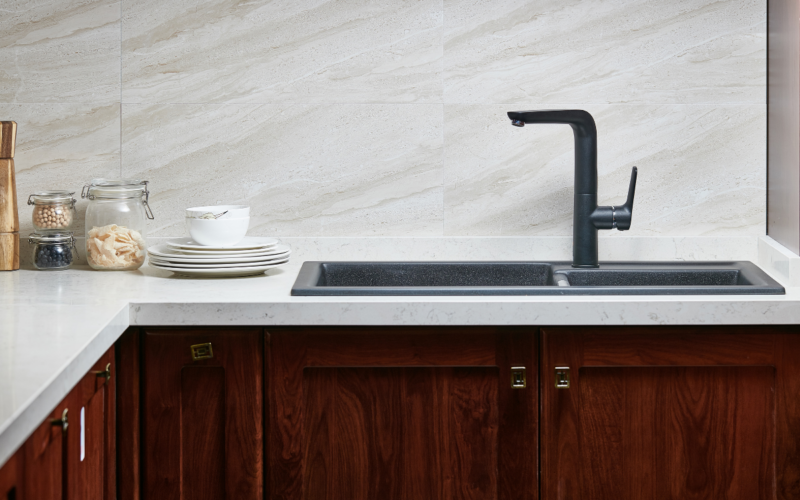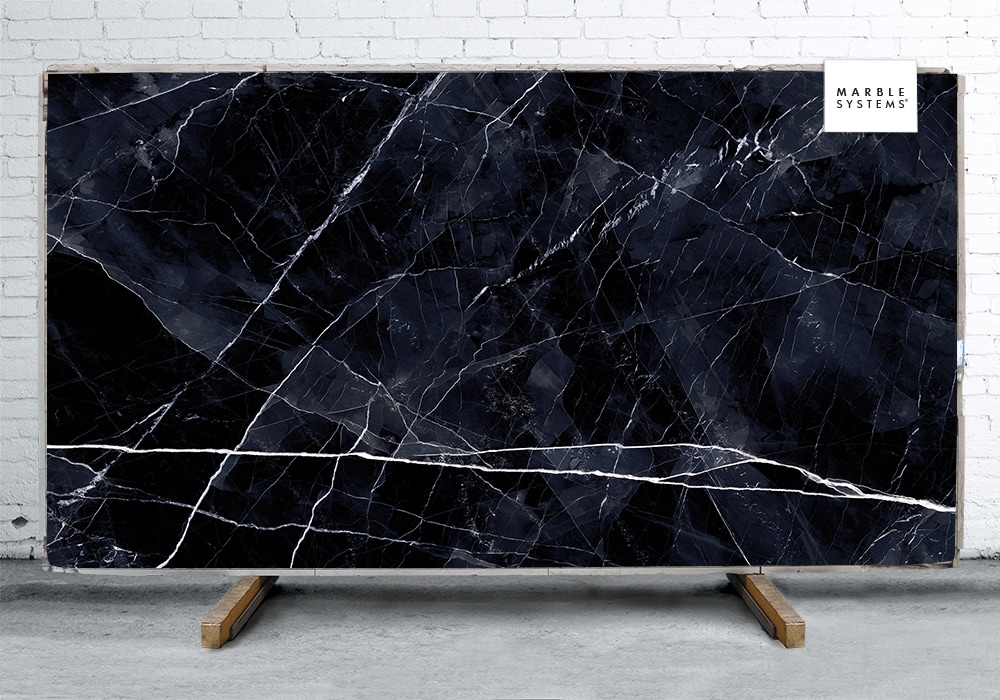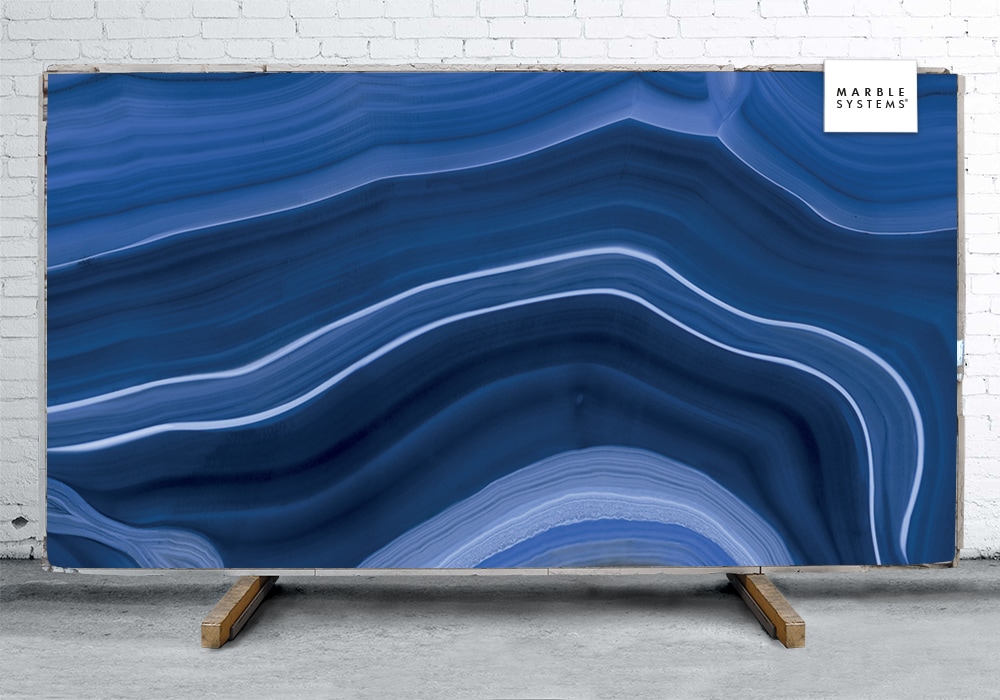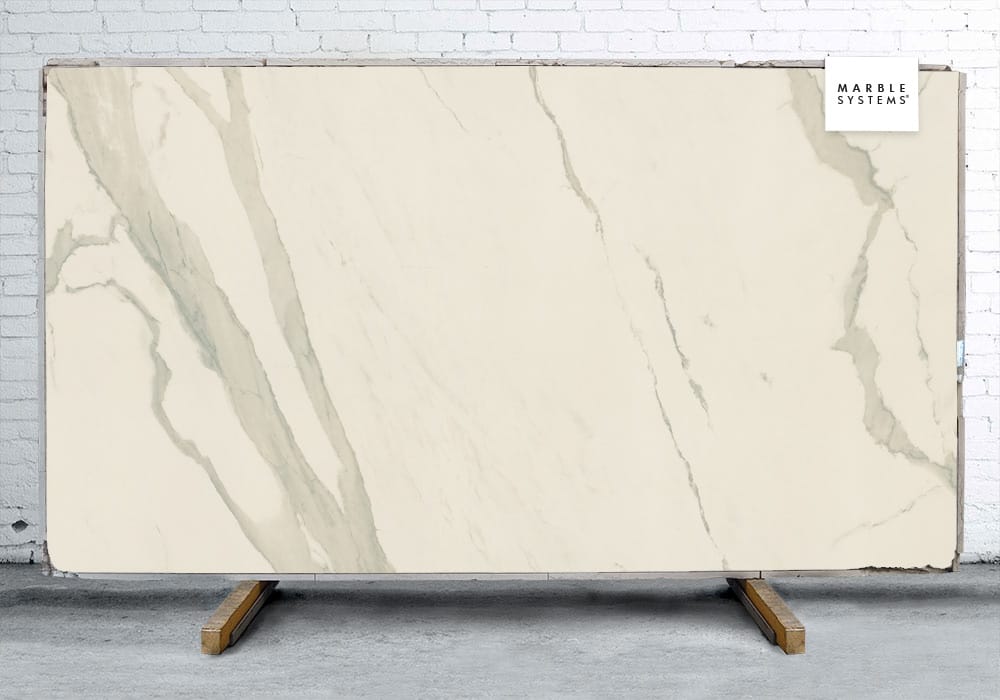Explore the Pros and Cons of Porcelain Countertops
Marble Systems‘ lovely porcelain slabs make stunning countertops.
Porcelain countertops are made from dense hardened ceramic material. It is created by combining several natural clays heated at intensely high temperatures. The name porcelain derives from the word Porcellana – the Italian word for a cowrie shell. Porcelain is a material that has been around for roughly 2,000 years in various parts of China and Europe. The use of porcelain spread across the globe slowly gaining a reputation for being incredibly beautiful and highly durable. It is a magnificent material used for kitchen and bathroom countertops. Let’s take a look at the pros and cons of porcelain countertops!
Pros of Porcelain Countertops
Before making your decision on a porcelain countertop it is imperative to know how the prized material performs. Below we have listed everything you need to know about the pros of porcelain countertops.
Appearance
Porcelain countertops consist mostly of kaolinite clay but other materials such as silica, feldspar, and oxide minerals also make up the counters. It is commonly referred to as “China Clay” in some circles due to its origin in ancient China. Porcelain comes in a wide array of eye-catching colors, but porcelain in black, grays, white, and browns is the most sought-after in kitchens and bathrooms.
Finish
The finish options for porcelain countertops are fewer than for other materials. You will often see porcelain countertops in either a matte or high-gloss finish. During the production process, porcelain counters receive a finish resulting in glossy porcelain or matte countertops. Matte-finished porcelain creates a more natural and rustic feel, while polished porcelain slabs look more shiny and flashy.

Durability
Porcelain countertops are suited to withstand heavy daily usage the use in a given space. Both porcelain kitchen countertops and porcelain bathroom countertops are made to last.
Porcelain slab countertops are also considered virtually indestructible by most designers. However, porcelain slab counters are more susceptible to breaking or cracking than harder materials. Porcelain countertops must be installed very carefully to prevent issues down the line, therefore professional installation is recommended. Porcelain is nearly 30% stronger than granite slabs (another natural material) – so while it can be delicate to install, it is still highly durable. TIts important to note that any form of blunt impact can damage porcelain countertops. Such force can also lead to the material chipping, or cause scratches and major cracks.
Porosity
When it comes to water tolerance it is crucial to know the porosity level of porcelain countertops for several reasons. This knowledge will help you determine if porcelain is right for your bathroom or kitchen.
Porcelain is a highly dense material boasting a low water absorption rate (0.05%). This low rating means that even under extreme exposure to heavy water conditions porcelain slabs absorb just about half of one percent (1.0%) of their weight in moisture. This makes porcelain slab counters great options for rooms that have water. Your porcelain kitchen counters will not wear away as to use them to make delicious meals or clean them.
Stain Resistance
Since porcelain countertops are extremely low in porosity there is only a slight element of staining that can occur on its surface. Porcelain countertops are highly resistant to, highly pigmented liquids, sauces, and chemicals that can leave stains on more porous surfaces.

Heat Resistance
Porcelain slab countertops are the superior choice for kitchens and bathrooms in terms of heat resistance. You can use heating appliances and cook on porcelain with virtually zero issues. Porcelain countertops are resistant to heat so they won’t appear warped or discolored from natural heat sources such as direct sunlight over time.
Cost
Finding the average costs for porcelain countertops is fairly simple. Many manufacturers and interior textile sellers have prices per square foot listed on their websites. You can also call retailers directly with cost-related questions.
When determining the cost of a porcelain slab remember that prices will vary. What you spend on your countertops will depend on the size of the slab, its coloring, patterning, and edging detail.
Per square foot, the average cost for a porcelain countertop slab ranges from $55 to $120. You can expect to spend this on the material and installation.
Cons of Porcelain Countertops
Fortunately, porcelain slab countertops have very few cons. The cons of porcelain counters include the propensity to crack due to blunt force, limited edging options, and cost if you have a low to modest budget.
The other material countertop ideas are available in our online shop, check out for different countertop style ideas.
Comparing Porcelain Countertops to Other Materials
Selecting the perfect countertop material for your home is a personal decision that will rely on your specific needs. Porcelain countertops serve as a showpiece in the home and make reliable spaces for preparing meals and making memories. It is one of the most popular options for countertop materials, making stunning additions to commercial and residential spaces.
When deciding to install porcelain countertop slabs take into consideration your budget, the functionality of porcelain, and its aesthetics.
Comparing porcelain countertops to other materials is one great way to see the advantages of the material more definitively. So here we will highlight some of the most notable ways porcelain compares to other popular materials used for counters. You can find in our blog the Porcelain vs. Quartz Countertops comparison.

Highlights
- Porcelain slabs are virtually impervious to moisture, unlike granite and marble slabs both of which will need to be sealed for moisture resistance.
- Porcelain also tends to be less expensive than natural stones which can cost thousands more to install and maintain.
- Porcelain countertops have a wide range of colors and patterns and can even be printed to mimic other materials. This gives the option to have counters that look more high-end at a fraction of the price.

Ultimately the final decision to install porcelain countertops will fall into what works best for your space and which style is in your budget. One thing is for certain, porcelain countertops are worth the investment. So rest assured that you will be getting excellent quality. Don’t forget to consider if it is suitable for you according to these pros and cons of porcelain countertops.
The possibilities with porcelain are so plentiful that it can be hard to narrow down options. If you need inspiration for porcelain slabs and porcelain countertops view some of the lovely designs we have featured in our inspiration gallery. In addition to porcelain countertops, Fairfax marble and granite countertops are also the perfect way to add value to your home.





